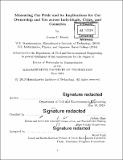Measuring car pride and its implications for car ownership and use across individuals, cities, and countries
Author(s)
Moody, Joanna C.(Joanna Charlotte)
Download1129596487-MIT.pdf (33.07Mb)
Other Contributors
Massachusetts Institute of Technology. Department of Civil and Environmental Engineering.
Advisor
Jinhua Zhao.
Terms of use
Metadata
Show full item recordAbstract
As the world recognizes that its growing reliance on private, fossil fuel-based vehicles is unsustainable, understanding how to avoid growth in car ownership and how to shift current users towards more efficient, environmentally-friendly, safe, and inclusive alternatives is a critical vision for meeting sustainable (transportation) development goals. Policy makers looking to shift consumer behavior away from cars need a more rigorous understanding of how different attitudes play a role in influencing car ownership and use and how this might vary by people and place. In this dissertation we provide deep insight into one of the many symbolic and affective motives behind car consumption: "car pride" or the attribution of social status and personal image to owning and using a car. Using data collected from individuals in two U.S. cities and in 51 countries around the world, we develop and demonstrate the reliability, validity, and invariance of polytomous (12, 7-point Likert-format statements) and dichotomous (9, dichotomous statements) survey measures for car pride using confirmatory factor analysis (CFA). With these measures, we explore variations in car pride across individuals, cities, and countries using Structural Equation Modeling (SEM). Across individuals, we find that those who are younger, male, and have higher incomes generally have higher car pride. Controlling for individual characteristics, we find that car pride is influenced by context. Between U.S. cities, we find that Houston has higher car pride than New York City. Across countries, we find that less developed countries exhibit higher car pride. We also disentangle the bidirectional causal relations between car pride and car consumption using instrumental variable (IV) techniques. We find that car pride strongly predicts car ownership, while no statistically significant relation exists in the opposite direction. Car pride additionally predicts car use, but only through its relation with car ownership (mediator). In the reverse direction, car use strongly reinforces car pride. While the directions of these relations appear almost universal across contexts, their strengths differ by country, emphasizing the importance of taking national context into account when measuring and interpreting symbolic motivations for car consumption. This dissertation builds a systematic understanding of car pride and its relations with car consumption across individuals, cities, and countries. For researchers, it serves as an example of methodological good-practice for empirical studies of attitude-behavior relations in transportation. For policymakers, it builds awareness of how policies can target attitudinal, social, and cultural factors, such as car pride, that present additional obstacles to the adoption of more sustainable transportation alternatives at both the individual and national levels.
Description
Thesis: Ph. D. in Transportation, Massachusetts Institute of Technology, Department of Civil and Environmental Engineering, 2019 Cataloged from PDF version of thesis. Includes bibliographical references (pages 217-241).
Date issued
2019Department
Massachusetts Institute of Technology. Department of Civil and Environmental EngineeringPublisher
Massachusetts Institute of Technology
Keywords
Civil and Environmental Engineering.